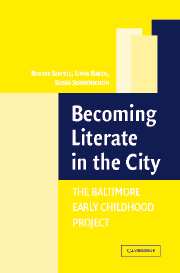Book contents
- Frontmatter
- Contents
- Preface
- 1 Early Appropriation of Literacy in Sociocultural Context
- 2 Growing Up in Baltimore : The Early Childhood Project
- 3 The Intimate Culture of Children's Homes
- 4 Processes of Literacy Enculturation in the Home
- 5 The Development of Literacy Competencies and Orientations
- 6 The Agenda and Practices of Schooling
- 7 Relations Between Homes and Schools
- 8 Conclusions and Implications for Policy and Practice
- References
- Name Index
- Subject Index
4 - Processes of Literacy Enculturation in the Home
Published online by Cambridge University Press: 17 December 2010
- Frontmatter
- Contents
- Preface
- 1 Early Appropriation of Literacy in Sociocultural Context
- 2 Growing Up in Baltimore : The Early Childhood Project
- 3 The Intimate Culture of Children's Homes
- 4 Processes of Literacy Enculturation in the Home
- 5 The Development of Literacy Competencies and Orientations
- 6 The Agenda and Practices of Schooling
- 7 Relations Between Homes and Schools
- 8 Conclusions and Implications for Policy and Practice
- References
- Name Index
- Subject Index
Summary
In this chapter, we focus on co-constructive processes during children's participation in literacy-relevant activities with others. As discussed in Chapter 1, our views are influenced by Vygotsky's (1978) theory of the importance of sociocultural context and by Barbara Rogoff's (1990) notion of the importance of guided participation for enculturation. According to Rogoff, a key influence on a child's successful appropriation of a skill is working with a more competent partner, one who can serve as a model by demonstrating necessary competencies and who can also help regulate the difficulty level of the task so it falls within a manageable range for the child. We favor the term co-construction because it acknowledges the importance of collaborative processes between participants, such as sharing different perspectives and reaching consensus. The evidence we present in this chapter supports the view that the most effective form of social interaction for fostering a child's literacy development is one that affords the child opportunities to play an active role in initiating events and generates positive affect.
We consider here both the cognitive and social-affective nature of children's interactions by documenting co-constructive processes in children's interactions with adults and peers in different literacy activities. Children growing up in industrialized societies have many opportunities to engage with printed material even before entering school. The breadth of the Early Childhood Project enabled us to observe children's interactions with others during several literacy activities.
- Type
- Chapter
- Information
- Becoming Literate in the CityThe Baltimore Early Childhood Project, pp. 103 - 133Publisher: Cambridge University PressPrint publication year: 1958

